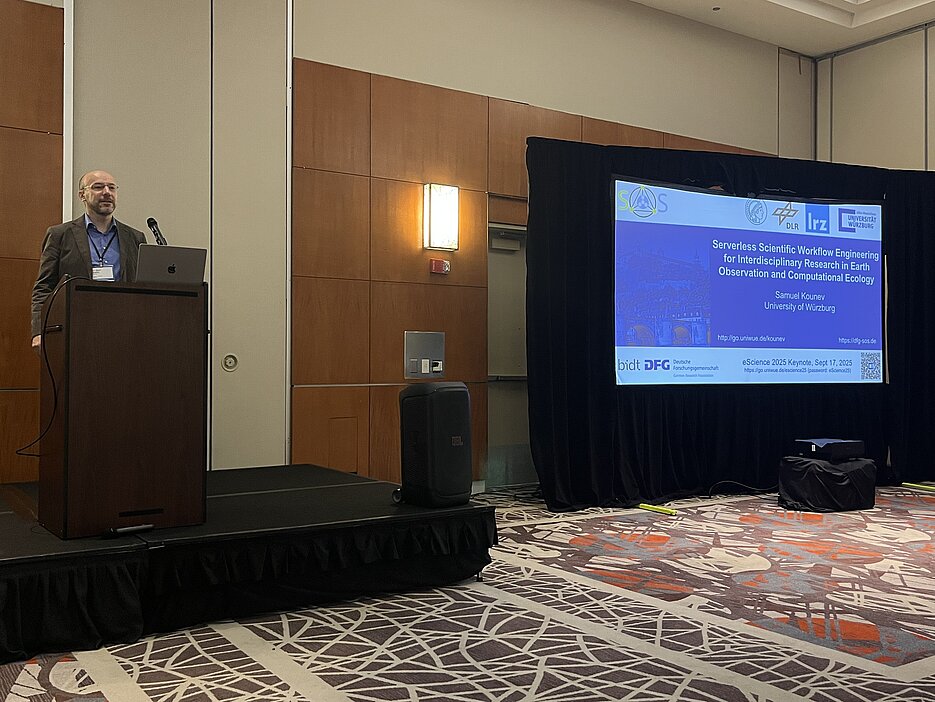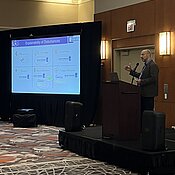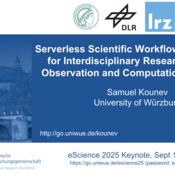Keynote Talk by Prof. Samuel Kounev at IEEE eScience 2025 on September 17th, 2025
17.09.2025Prof. Samuel Kounev delivered a Keynote on "Serverless Scientific Workflow Engineering for Interdisciplinary Research in Earth Observation and Computational Ecology" at the 21st IEEE International Conference on eScience. Chicago, September 15-18, 2025
Prof. Samuel Kounev delivered a Keynote on "Serverless Scientific Workflow Engineering for Interdisciplinary Research in Earth Observation and Computational Ecology" at the 21st IEEE International Conference on eScience. Chicago, September 15-18, 2025. The presentation slides are available online (see link on the title slide).
Title: Serverless Scientific Workflow Engineering for Interdisciplinary Research in Earth Observation and Computational Ecology
Link: eScience Conference
Abstract
Modern research in the area of earth observation (EO) and computational ecology poses challenges on the computing, storage, and communication infrastructure needed to analyze the huge volumes of data obtained from remote sensing systems. To develop, run, optimize, and maintain EO processing workflows, geoscientists nowadays need to have both in-depth domain knowledge as well as extensive skills in data science and IT systems. Workflow developers face the challenges of inconsistent terminology, a vast number of algorithms, contradictory recommendations, non-transparent data (pre-)processing, and the lack of comprehensive standards for workflow specification and data exchange. This results in very limited code and artifact reusability as well as poor result reproducibility. Moreover, the integration and scalable processing of huge data volumes (up to Petabytes) from multiple distributed and heterogeneous sources poses a significant entry barrier for geoscientists.
In this context, we introduce a new large-scale research initiative aiming to address the above challenges through a collaboration between computer scientists, geoscientists, and ecologists in an interdisciplinary setting. The Research Unit "SOS: Serverless Scientific Computing and Engineering for Earth Observation and Sustainability Research (DFG FOR)" (https://dfg-sos.de) includes partners from the University of Würzburg, the German Aerospace Center (DLR), the Leibniz Supercomputing Sentre (LRZ), and the Max Planck Institute of Animal Behavior (MPIAB). Established in January 2025 by the German Research Foundation (DFG), this long-term project pursues three main goals: (1) significantly lower the technical entry barrier for the development and execution of complex high-volume EO workflows with multiple distributed and heterogeneous data sources in an interdisciplinary setting, (2) enable application-level automation, sharing, and (third-party) reuse of EO workflows—including workflow designs, implementations, and research data—across projects, teams, application domains, and organizations, and (3) address a set of exemplary interdisciplinary research questions focussed on investigating the impact of climate change on the land surface dynamics (snow cover, snowmelt) and the movement pathways of migratory animals, as a basis for predicting future space use and species composition. We discuss the current state of the project and present some initial results towards providing semantically enriched and reusable EO workflow components.
Contact: Prof. Samuel Kounev, Chair of Software Engineering, University of Würzburg





